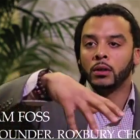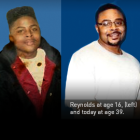
Giving Kids a Choice: Interview with Adam Foss at 2013 Models for Change Conference
|
An interview with Adam Foss, a juvenile prosecutor with the Suffolk county district attorney’s office in Boston.
Juvenile Justice Information Exchange (https://jjie.org/page/296/)

In late September, Torri was driving down the highway with her 11-year-old son Junior in the back seat when her phone started ringing.
It was the Hamilton County Sheriff’s deputy who worked at Junior’s middle school in Chattanooga, Tennessee. Deputy Arthur Richardson asked Torri where she was. She told him she was on the way to a family birthday dinner at LongHorn Steakhouse.
“He said, ‘Is Junior with you?’” Torri recalled.
Earlier that day, Junior had been accused by other students of making a threat against the school. When Torri had come to pick him up, she’d spoken with Richardson and with administrators, who’d told her he was allowed to return to class the next day. The principal had said she would carry out an investigation then. ProPublica and WPLN are using a nickname for Junior and not including Torri’s last name at the family’s request, to prevent him from being identifiable.
When Richardson called her in the car, Torri immediately felt uneasy. He didn’t say much before hanging up, and she thought about turning around to go home. But she kept driving. When they walked into the restaurant, Torri watched as Junior happily greeted his family.
Soon her phone rang again. It was the deputy. He said he was outside in the strip mall’s parking lot and needed to talk to Junior. Torri called Junior’s stepdad, Kevin Boyer, for extra support, putting him on speaker as she went outside to talk to Richardson. She left Junior with the family, wanting to protect her son for as long as she could ...

An interview with Adam Foss, a juvenile prosecutor with the Suffolk county district attorney’s office in Boston.

The task of looking at kids who have come to the court’s attention and figuring out the best way to support them and their families.

I shudder to think of all the instances of out-of-control teenage anger that nearly killed another, when those same angry kids never really intended to seriously hurt anyone in the first place.

Over the years I have been blessed with having two Christmases every year; one with my mother's side of the family and the other with the Pitre's, my dad's side. Being raised by my charitable grandmother Mama Nechie my entire life, Christmas was every time she went to any store. Whether it was a grocery store, expensive department store or cheap thrift store, Mama Nechie would always bring me back something nice. Now that I think about it, that’s probably why I did not receive many gifts on Christmas. Christmas at home with her was just another regular day.

As a Public defender with the Legal Aid Society’s Adolescent Intervention and Diversion Project, Donna Henken works with 13- to 15-year-olds charged with felony crimes. These adolescents are known as juvenile offenders and they are tried in adult criminal court rather than family court. Henken’s clients struggle with the same issues as juveniles in the family court system. According to the Legal Aid Society, about 20 percent of these youth have experience with the foster care system. Almost two-thirds have special-education needs and about 25 percent of them have significant mental health issues that require ongoing care.

The tough on crime policies born in the 90s have run smack into the fiscal realities of the recession, with some surprisingly positive consequences for juvenile justice reform.

“The general purpose of this grant is, really at a high level, to engage potential government partners at the county-level, and engage and educate them about the Pay for Success opportunities in these two areas."

Reynolds Wintersmith was one of eight federal prisoners, all having been convicted in federal court on non-violent drug charges, to have their sentences shortened by President Barack Obama.